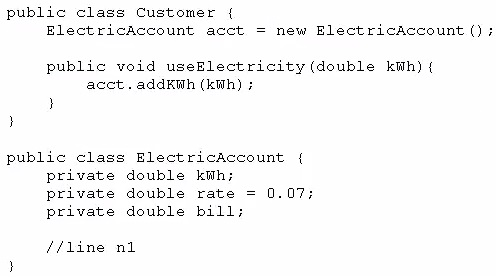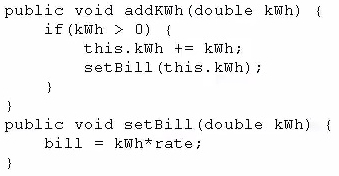

Given these two classes:
Any amount of electricity used by a customer (represented by an instance of the Customer class) must contribute to the customer's bill (represented by the member variable bill) through the useElectricity method.
An instance of the Customer class should never be able to tamper with or decrease the value of the member variable bill.
How should you write methods in the ElectricAccount class at line n1 so that the member variable bill is always equal to the value of the member variable kwh multiplied by the member variable rate?
A.
B.
C.
D.
Vicky_65
Highly Voted 2 years, 3 months agoHirushi
Highly Voted 2 years, 7 months agoMPignaProTech
Most Recent 9 months, 1 week agoThe_Java_Champion
7 months, 1 week agoiheb07
1 year, 2 months agoSezam
1 year, 10 months agoa_really_reliable_programmer
1 year, 11 months agombns
1 year, 11 months agotawa_z58
1 year, 6 months agoTanmoyB
2 years, 6 months agoHirushi
2 years, 7 months agoHirushi
2 years, 7 months agoHirushi
2 years, 7 months agoHirushi
2 years, 7 months agoHirushi
2 years, 7 months agoHirushi
2 years, 7 months agoHirushi
2 years, 7 months agoHirushi
2 years, 7 months agoDef8
2 years, 8 months agocarloswork
2 years, 9 months agoiSnover
2 years, 9 months agoRdharma
2 years, 9 months agoshivkumarx
2 years, 10 months ago